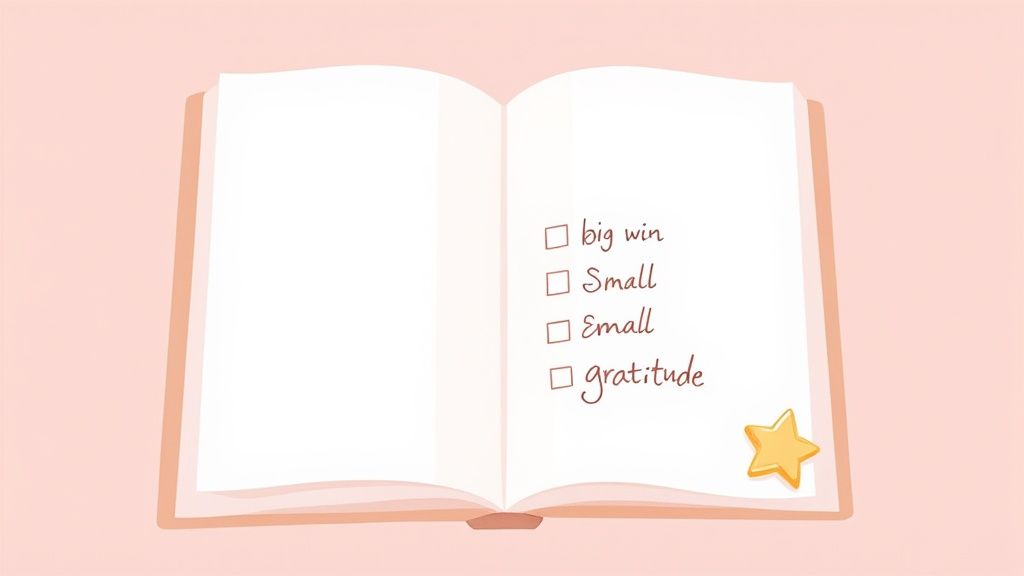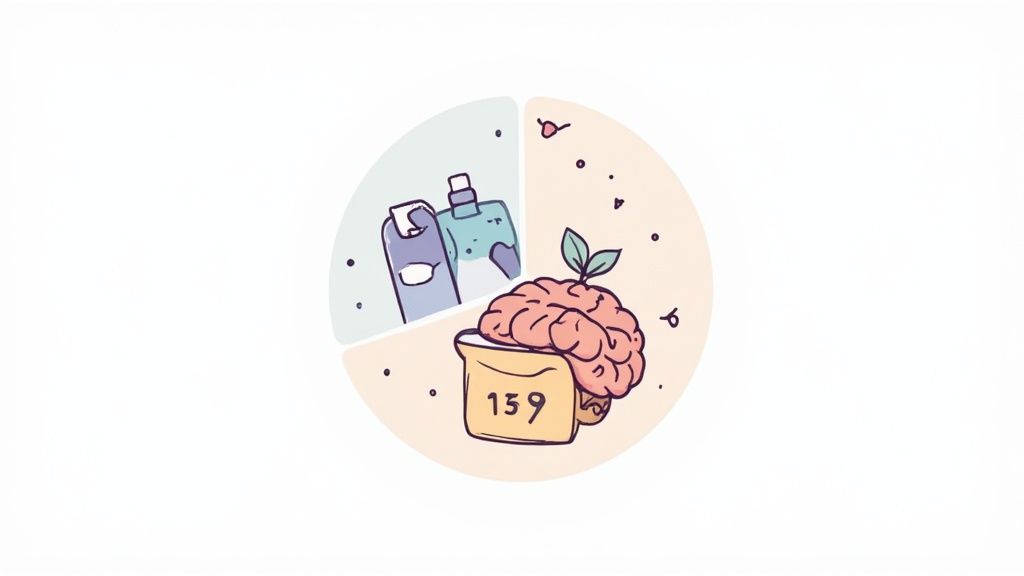8 Powerful Weekly Reflection Questions for 2025

The end of the week often arrives in a blur of completed tasks and looming deadlines. But what if you could pause, look back with intention, and turn those seven days into a powerful engine for growth? The practice of a weekly review, guided by insightful questions, is the bridge between being busy and being effective. It's a structured moment to process accomplishments, learn from setbacks, and strategically plan for the week ahead, preventing the drift that often sabotages long-term goals.
This guide provides a curated list of potent weekly reflection questions designed to foster deep self-awareness, track meaningful progress, and refine your focus. Each prompt is more than just a question; it's a tool for analysis. We will explore the 'why' behind each one and provide actionable steps for integrating this transformative habit into your routine. For those looking to deepen their introspection, exploring additional self-discovery journal prompts can provide further clarity on personal values and long-term vision.
Crucially, we'll demonstrate how to leverage the power of Obsidian to create a seamless, interconnected system for personal development. You'll learn how to build a dynamic weekly review template that links your reflections to goals, projects, and daily notes, transforming your vault into a personalized engine for continuous improvement. For users looking to implement this system immediately, Obsibrain offers pre-configured templates for weekly reviews, saving you setup time and ensuring you start with a best-practice workflow. Get ready to make every week your most insightful week yet.
1. What went well this week?
This foundational question is one of the most powerful weekly reflection questions you can ask. Popularized by positive psychology researchers like Martin Seligman, it deliberately shifts your focus from problems to progress. By actively seeking out and documenting your successes, you counteract the brain's natural negativity bias, which tends to fixate on what went wrong. This simple prompt helps build momentum, reinforces effective behaviors, and fosters a sense of gratitude and accomplishment.

This question isn't just about big, project-defining wins. It’s about creating a balanced view of your week by acknowledging victories of all sizes, from professional achievements to personal milestones.
How to Implement This Question
To get the most out of this prompt, move beyond generic answers. Specificity is key to making the reflection meaningful and actionable.
Be Specific: Instead of "had a productive week," write "Completed the Q3 financial report two days ahead of the deadline."
Include Small Wins: Don't overlook minor successes. "Finally organized my desktop files" or "Stuck to my morning workout routine all five days" are valid and important wins.
Cover Multiple Life Areas: Look for positives across different domains: work, health, relationships, and personal development.
Key Insight: The goal is not just to feel good, but to identify what actions, mindsets, and conditions led to positive outcomes so you can replicate them in the future.
Obsidian Workflow Integration
Obsidian's linking capabilities make this practice incredibly powerful. When you log a "win" in your weekly note, you can turn it into a data point for future analysis.
Tag Your Wins: Use a dedicated tag like
#winor#successfor each item you list.Link to Projects or Goals: If a success is tied to a specific project, link it directly (e.g.,
[[Project Phoenix]] - Finalized the stakeholder presentation). This creates a backlink on your project page, building a log of all its associated successes.Use Dataview: Create a simple Dataview query on a dashboard or in your yearly review note to automatically pull all entries tagged with
#win. This gives you an instant, automated "brag document" or highlight reel of your accomplishments. Obsibrain enhances this by providing pre-built dashboards that automatically aggregate these wins, making it effortless to visualize your progress over time.
2. What challenged me this week and what did I learn from it?
This is one of the most critical weekly reflection questions for fostering resilience and a growth mindset. Rooted in principles from Carol Dweck's research, this prompt moves you beyond simply listing setbacks. It forces you to reframe challenges as learning opportunities, transforming potential failures into fuel for future growth and preventing you from making the same mistakes twice.

This question encourages you to analyze the root cause of a difficulty, whether it's a missed deadline or a difficult conversation, and extract a concrete lesson. It's the engine of continuous improvement, ensuring that every stumble provides a stepping stone to becoming more capable and self-aware.
How to Implement This Question
To avoid rumination and ensure this exercise is productive, focus on actionable takeaways rather than dwelling on the problem itself.
Separate the Event from Identity: Frame the challenge objectively. Instead of "I failed the presentation," write "The presentation didn't land with the audience because the data wasn't clear."
Ask 'What Would I Do Differently?': This forward-looking question is key. The answer becomes your lesson. For example, "Next time, I will create a one-page summary to accompany the data slides."
Document Specific Lessons: Don't just list the problem. Articulate the learning clearly, such as "Lesson: Underestimating the prep time for client meetings leads to rushed work."
Key Insight: Challenges are data. By analyzing what went wrong and documenting the lesson, you are systematically debugging your personal and professional processes.
Obsidian Workflow Integration
Obsidian excels at connecting ideas, making it the perfect tool to turn lessons into an accessible knowledge base that prevents repeat errors.
Tag Your Lessons: Use a dedicated tag like
#lesson-learnedor#growth-opportunityfor each reflection.Create a Central "Lessons Learned" Note: Create a note titled
[[Lessons Learned]]. When you document a new lesson in your weekly note, link it back to this central note (e.g.,[[Lessons Learned]] - Over-committing to small tasks derails focus on deep work.).Use Dataview for Review: On your
[[Lessons Learned]]page, create a Dataview query to automatically pull in every line item tagged with#lesson-learnedfrom across your entire vault. This creates a powerful, dynamic list of all the wisdom you've gained from your challenges, ready for review. The knowledge management system in Obsibrain provides a dedicated space for these insights, ensuring they are not just logged but resurfaced at relevant times.
3. How did I progress toward my goals this week?
This powerful question bridges the gap between your daily actions and long-term ambitions. Popularized by frameworks like OKRs (Objectives and Key Results) and principles in Stephen Covey's work, it forces you to assess whether your weekly efforts are truly aligned with your overarching objectives. It serves as a vital course-correction mechanism, ensuring you're not just busy, but busy on the things that matter most. This prompt moves you from reactive task completion to proactive, goal-oriented progress.
This question isn't about achieving massive breakthroughs every week. It's about building a consistent, documented chain of evidence that shows you are moving forward, providing motivation and accountability in equal measure.
How to Implement This Question
To make this reflection effective, you need to connect specific actions to specific goals. Vague assessments won't drive meaningful change.
Use Quantifiable Metrics: Instead of "worked on my business," try "Acquired 2 new clients, moving me 20% closer to my quarterly goal of 10."
Acknowledge Incremental Steps: "Wrote 1,500 words for my novel" or "Completed all three planned workouts for my fitness goal" are significant steps.
Explicitly Link Actions to Goals: Clearly state how a weekly action connects to a larger objective, for example, "Completed the Python certification module (Action) to support my career goal of becoming a data analyst (Goal)."
Key Insight: Progress isn't always linear. This question also helps you identify when a goal is becoming unrealistic or no longer relevant, allowing you to adjust your strategy proactively.
Obsidian Workflow Integration
Obsidian excels at connecting disparate pieces of information, making it ideal for tracking goal progress across different timeframes.
Create Goal Notes: Have a dedicated note for each major goal (e.g.,
[[Goal - Launch Side Project]]).Link Weekly Progress: In your weekly note, list your progress and link directly to the relevant goal note. For example:
- [[Goal - Launch Side Project]]: Finalized the landing page copy and design mockup.Use Dataview for a Goal Dashboard: On each goal note, embed a Dataview query that pulls in all linked mentions from your weekly notes. This creates an automated log of every single step you've taken toward that goal. For those looking to streamline this process, explore how to build dynamic goal-tracking systems with Obsibrain's periodic review features.
4. What relationships did I invest in this week?
This powerful question shifts your weekly reflection from purely task-based achievements to the quality of your human connections. Championed by researchers like Brené Brown and validated by long-term studies like the Harvard Study of Adult Development, this prompt acknowledges that strong relationships are a critical pillar of well-being and success. It forces you to intentionally consider where you are directing your social energy, ensuring that the important people in your life aren't unintentionally neglected.
This isn't about simply listing who you talked to. It's about evaluating the quality and intentionality of your interactions, from deep conversations with a partner to mentoring a junior colleague.
How to Implement This Question
To make this reflection meaningful, focus on the substance of the interaction rather than just the occurrence. Intentionality is the key differentiator between a casual encounter and a genuine investment.
Be Specific: Instead of "chatted with family," write "Had a 45-minute, phone-free dinner with my parents where we discussed their upcoming trip."
Focus on Quality: Note the depth of connection. "Mentoring session with Alex where we mapped out their career goals for the next year" is more impactful than "had a coffee with Alex."
Include All Circles: Consider relationships across various domains: family, close friends, romantic partners, colleagues, and professional mentors.
Key Insight: Relationships, like any valuable asset, require deliberate and consistent investment. This question helps you audit your relational portfolio and identify where you need to reallocate your most precious resource: your time and attention.
Obsidian Workflow Integration
Obsidian can transform this reflection into a lightweight personal CRM, tracking the health of your most important connections.
Create People Notes: Have a dedicated note for each important person in your life (e.g.,
[[Jane Doe]]).Link Your Interactions: In your weekly note, when you log an investment, link to their person note. For example:
Had a great weekly check-in call with [[John Smith]] about [[Project Phoenix]]. This automatically creates a backlink on John's note, showing a history of your interactions.Use Tags for Context: Add tags to classify the interaction, such as
#mentoring,#family-time, or#networking. A Dataview query can then pull all interactions with a specific person or of a specific type. If you're looking to build a more robust system, you can explore advanced options like those in our guide to meetings and CRM features.
5. How did I take care of my physical and mental health this week?
This question grounds your weekly reflection in the most fundamental aspect of your life: your well-being. Promoted by wellness coaches, sleep scientists like Matthew Walker, and mental health advocates, this prompt ensures self-care isn't an afterthought but a planned, reviewed priority. It moves the focus from purely professional output to the sustainable energy systems that fuel that output, recognizing that physical and mental health are the bedrock of all other achievements.

Answering this question forces you to assess your habits holistically. It helps you identify patterns between your energy levels, mood, and the self-care actions you took, providing direct feedback on what refuels you and what drains you.
How to Implement This Question
To make this reflection effective, focus on concrete actions and data points rather than vague feelings. This transforms a simple check-in into a powerful tool for improving your well-being.
Track Specific Metrics: Instead of "I slept okay," note "Averaged 7.5 hours of sleep, with a consistent 10 PM bedtime."
Acknowledge Both Actions and Inactions: Be honest about both successes and failures. Note "Meditated for 10 minutes on 4/7 days" and also "Skipped my lunchtime walk because of meetings."
Connect Health to Performance: Reflect on how your health habits impacted your work and personal life. Did getting enough sleep improve your focus? Did stress lead to procrastination?
Key Insight: Consistent, small acts of self-care compound over time. This question isn't about judging your week's performance but about raising awareness to make healthier choices next week.
Obsidian Workflow Integration
Obsidian excels at tracking habits and connecting them to your daily and weekly notes, making it an ideal tool for monitoring your well-being over time.
Use Daily Note Properties: In your daily note template, use properties (YAML frontmatter) to track key metrics like
sleep_hours,exercise_minutes, ormood: (1-5).Centralize with Dataview: In your weekly reflection note, use a Dataview table to automatically pull and summarize these metrics from your daily notes for the past week. This gives you an at-a-glance dashboard of your health data.
Integrate Habit Tracking: For a more robust solution, use a dedicated system for monitoring your routines. Learn more about Obsibrain's habits tracking features to see how you can embed a visual tracker directly into your weekly review.
6. What am I grateful for from this week?
While reflecting on what went well focuses on achievement, this question shifts your perspective toward appreciation. Popularized by researchers like Brené Brown and Robert Emmons, the practice of gratitude is scientifically linked to improved mental health, resilience, and overall well-being. It moves beyond accomplishments to acknowledge the support, opportunities, and simple pleasures that enrich our lives, counteracting the tendency to take positive circumstances for granted.
This question helps you notice the positive inputs in your life, not just the outputs you produced. It fosters a mindset of abundance by highlighting what you have, rather than fixating on what you lack.
How to Implement This Question
To make this practice truly impactful, focus on depth and specificity rather than just listing items. The emotional connection to your gratitude is what makes it powerful.
Be Specific: Instead of "I'm grateful for my team," write "I'm grateful for Sarah, who stayed late to help me troubleshoot the server issue on Wednesday."
Focus on 'Why': Don't just list what you're grateful for; briefly note why. "Grateful for my morning coffee" becomes "Grateful for my quiet morning coffee routine, which gives me 15 minutes of peace before the day starts."
Include Small Joys: Acknowledge simple pleasures like a beautiful sunset, a song you enjoyed, or a delicious meal. These small points of light add up. To further deepen your appreciation, read about Gratitude Happiness Cultivating A Grateful Mindset.
Key Insight: Gratitude isn't about ignoring difficulties; it's about actively recognizing the good that coexists with the challenges, which builds emotional resilience.
Obsidian Workflow Integration
Obsidian can turn your gratitude log into a powerful, searchable repository of positivity that you can revisit whenever you need a boost.
Tag Your Gratitude: Use a dedicated tag like
#gratitudefor each entry in your weekly reflection.Link to People or Context: If you're grateful for a person, link to their note:
[[John Doe]] for his insightful feedback on my draft. This builds a positive history on that person's page within your vault.Create a Gratitude Dashboard: Use Dataview to create a dynamic note that pulls all entries tagged with
#gratitude. You can organize it by week, month, or year to create a powerful, automated log of everything you've appreciated over time. Obsibrain's journaling templates automatically include a gratitude section, making it a seamless part of your daily and weekly practice.
7. Where did I waste time or energy this week, and why?
This incisive question is one of the most practical weekly reflection questions for reclaiming focus and intentionality. Championed by productivity experts like David Allen and foundational to concepts like Cal Newport's 'Deep Work', it pushes you to honestly examine inefficiencies. It's not about self-criticism; it's about uncovering the root causes of energy drains and unproductive patterns, from procrastination and perfectionism to poor boundaries and a lack of clarity.

By identifying these leaks, you gain the self-awareness needed to plug them. This question transforms your reflection from a simple review into a diagnostic tool for improving how you invest your most valuable resources: time and energy.
How to Implement This Question
To make this inquiry productive, approach it with curiosity rather than judgment. The goal is to understand your behavior, not to punish yourself for it.
Dig Deeper with 'Why': Don't stop at "spent too much time on social media." Ask why. Was it because you were avoiding a difficult task? Lacking a clear plan for your break? Feeling disconnected?
Identify Specific Drains: Pinpoint the exact activities. Examples include "re-reading the same emails multiple times," "attending a meeting without a clear agenda," or "over-researching a low-stakes decision."
Distinguish Breaks from Waste: Be clear about the difference. A 15-minute walk to recharge is an investment. Mindlessly scrolling for 45 minutes because of task ambiguity is a drain.
Key Insight: Wasted energy often stems from a lack of clarity. Pinpointing where you felt indecisive, unfocused, or overwhelmed is the first step toward creating systems that prevent it.
Obsidian Workflow Integration
Obsidian is perfect for tracking these patterns and turning insights into systemic changes. By linking your observations, you can build a personalized system for optimizing your focus.
Tag Your Drains: Use a specific tag like
#time-drainor#energy-leakfor each identified issue in your weekly note.Link to Root Causes: Connect the drain to its underlying cause. For example:
Spent 2 hours procrastinating on the report [[perfectionism]]orAgreed to a last-minute request that derailed my afternoon [[boundary-setting]]. This builds a network of interconnected notes.Create a Dataview "Focus Dashboard": Set up a Dataview query that lists all entries tagged with
#time-drain. You can even group them by linked causes (e.g.,GROUP BY link) to see which patterns are most common, helping you prioritize what to work on next.
8. What am I proud of about how I showed up this week?
While many weekly reflection questions focus on outcomes and achievements, this prompt shifts the lens to character and integrity. Drawing from concepts in virtue ethics and the work of researchers like Brené Brown, it asks you to evaluate not just what you did, but how you did it. This question encourages you to assess your actions against your personal values, focusing on internal alignment rather than external validation. It’s about recognizing the moments where you acted with courage, kindness, or honesty, especially when it was difficult.
This question helps you build self-respect and reinforces the kind of person you want to be. It connects your daily actions to your core identity, making your personal growth tangible and meaningful beyond just a list of completed tasks.
How to Implement This Question
Answering this question requires honest self-assessment. Look for the moments between the big events where your character was tested and you responded in a way that aligns with your values.
Focus on Behavior: Instead of "I was a good leader," specify "I stayed calm and listened to everyone's perspective during the tense project meeting, even when I felt defensive."
Acknowledge Difficult Choices: Note instances where you chose principle over convenience, such as "Admitted my mistake in the team channel instead of letting someone else take the blame."
Connect to Values: Explicitly link the action to a core value. For example, "I followed through on my commitment to help a colleague, which aligns with my value of reliability."
Key Insight: Pride in how you show up is a powerful internal motivator that is independent of external results. This builds resilience and a stable sense of self-worth.
Obsidian Workflow Integration
Obsidian is perfect for tracking character-based growth by linking actions to your core principles. This creates a powerful feedback loop for personal development.
Create a Values Note: Have a central note, like
[[My Core Values]], where you define what's most important to you (e.g., Integrity, Courage, Compassion).Link Your Reflections: In your weekly note, when you identify a moment of pride, link it directly to the relevant value. For example:
- Stayed patient while teaching the new intern a complex process [[Compassion]].Review with Dataview: On your
[[My Core Values]]note, embed a Dataview query to see all the times you've acted in alignment with that value. This provides concrete evidence of your character in action, reinforcing your identity.
8-Question Weekly Reflection Comparison
What went well this week?
Low — simple reflective prompt
Minimal time/journal entry
Increased morale; recognition of repeatable successes 📊
Weekly reviews, team retros, morale boosting
Boosts motivation and momentum ⭐
What challenged me this week and what did I learn from it?
Moderate — requires emotional processing & analysis
Time, honest introspection, possible support
Learning extraction; improved resilience and problem‑solving 📊
Post‑mortems, growth mindset practice, skill development
Turns setbacks into actionable lessons ⭐
How did I progress toward my goals this week?
Moderate — depends on clarity of goals
Tracking tools, metrics, planning time
Measurable progress; better prioritization and alignment 📊
OKRs, project checkpoints, personal goal tracking
Increases accountability and strategic focus ⭐
What relationships did I invest in this week?
Low–Moderate — reflective plus scheduling actions
Time, intentional interactions, emotional energy
Stronger connections and social support; improved well‑being 📊
Work‑life balance checks, leadership and mentoring
Prevents relationship drift; strengthens networks ⭐
How did I take care of my physical and mental health this week?
Moderate — multi‑dimensional assessment
Habit trackers, health metrics, routines, possible professional help
Better energy, cognitive function, early issue detection 📊
Wellness programs, habit formation, high‑stress periods
Foundation for sustained performance and resilience ⭐
What am I grateful for from this week?
Low — simple gratitude practice
Minimal time; journaling or listmaking
Improved mood, sleep, and optimism; increased resilience 📊
Daily/weekly mental health routines, journaling
Quick, evidence‑backed boost to well‑being ⭐
Where did I waste time or energy this week, and why?
Moderate–High — root‑cause analysis required
Time audits, honest self‑assessment, tracking tools
Identifies inefficiencies; enables corrective strategies 📊
Productivity overhauls, time management improvement
Reveals patterns to reduce future waste ⭐
What am I proud of about how I showed up this week?
Moderate — values and behavior reflection
Time for introspection; possibly value clarification exercises
Greater self‑respect; clearer values‑behavior alignment 📊
Leadership development, character growth, coaching
Builds intrinsic motivation and integrity ⭐
From Reflection to Action: Planning Your Week Ahead
You have now explored a comprehensive set of weekly reflection questions designed to cultivate deep self-awareness and intentional living. From celebrating your wins and learning from challenges to assessing your progress on long-term goals and nurturing your well-being, these prompts serve as a powerful toolkit. Each question is a lens, offering a unique perspective on your week and helping you distill complex experiences into clear, actionable insights within your Obsidian vault.
The true value of this practice, however, is not found solely in looking back. The ultimate goal is to bridge the gap between reflection and action. Your answers to these questions are not just journal entries; they are data points that inform a more strategic and aligned week ahead. By transforming your reflections into concrete intentions, you create a powerful feedback loop that drives continuous improvement.
Crystallizing Your Insights into Intentions
The final, critical step in your weekly review process is to synthesize your learnings. After analyzing your progress, challenges, and areas where energy was misplaced, you can make informed decisions about the future. Instead of building a generic to-do list, your reflections empower you to set priorities that truly matter.
This process involves asking one final, forward-looking question:
Based on everything I’ve learned about the past week, what are the 1-3 most important things I need to accomplish in the week to come?
This is where your Obsidian workflow shines. You can link your reflections directly to your weekly planning notes. For instance, if you identified that a specific project stalled because you lacked a key piece of information (a learning from "What challenged me?"), your top priority for the next week might be to schedule a meeting to resolve that blocker. This ensures your planning is not reactive, but a direct, strategic response to your self-analysis.
Creating a Virtuous Cycle of Growth
Mastering the art of weekly reflection is about more than just checking boxes; it’s about building a sustainable system for personal and professional growth. When you consistently connect your past experiences to your future plans, you stop repeating the same mistakes and start building momentum. Each week becomes a deliberate step forward, guided by the wisdom you've uncovered.
This habit transforms your Obsidian vault from a simple repository of notes into a dynamic engine for self-improvement. Your weekly review becomes a cornerstone ritual that ensures you are not just busy, but productive and purposeful. By regularly engaging with these weekly reflection questions, you ensure your daily actions remain aligned with your most important values and long-term aspirations, making every week a meaningful chapter in your journey.
Ready to supercharge your reflection and planning process in Obsidian? The templates and workflows discussed in this article can be automated and enhanced with Obsibrain. Discover pre-built frameworks for weekly reviews and goal tracking by visiting Obsibrain to streamline your journey from insight to action.
Last updated